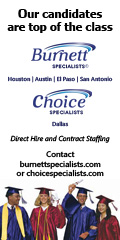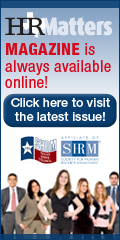HR Matters
Texas SHRM
If there have been any changes in your volunteers, report them to your Regional Administrator. Keep SHRM informed of any changes to volunteer e-mail addresses, contact information, and role changes.
Host a workforce readiness program (see workforce readiness best practices in the SHAPE planning workbook for other ideas).
Super mega and 100% chapters are allowed two e-blasts per quarter to promote their activities to all SHRM members in the chapter’s ZIP code range. Complete the online request form in the VLRC.
Consider joining SHRM Connect and starting a group for your chapter members to communicate. Promote HR Certification Institute certification on your chapter website. Promote the SHRM Foundation Regional Scholarships; applications due in July.
Check the LeadersEdge blog for news and updates from SHRM. Determine if your organization will be submitting a Pinnacle award – applications are due in early September.
WGU Texas has partnered with the Texas State Council to offer $2,000 "Go Further in HR Scholarships".
These scholarships are designed for motivated HR personnel who wish to continue their education and earn a bachelor's or master’s degree.
WGU Texas Business College offers MBA degree programs in addition to a B.S. in Business Human Resource Management degree that provides expertise in the management of people at work, giving HR professionals the skills and knowledge to become an effective HR manager and staff specialist. This program covers the six categories that make up the HR Body of Knowledge established by the Human Resources Certification Institute (HRCI) and as part of this program, students are required to pass one of two HR-specific, recognized industry exams:
• The Professional in Human Resources (PHR) Certification Exam (administered by HRCI)
OR
• The Assurance of Learning Exam (administered by the Society of Human Resource Management (SHRM)).
WGU Texas is a nonprofit, online university designed to expand access to higher education and meet the education needs of busy adult learners.
Here's why you should consider WGU Texas:
• An innovative, competency-based approach to education designed to let you take advantage of your prior experience and possibly accelerate your program.
• Personalized, one-on-one faculty support.
• A nonprofit university with affordable, flat-rate tuition.
• Regionally accredited online bachelor's and master's degrees in health professions (including nursing), business, information technology, and teacher education.
• Federal financial aid and scholarships available to those who qualify.
• No set class times. Study anytime, anywhere.
For eligibility requirements and to apply for the Go Further in Human Resources Scholarship, visit http://texas.wgu.edu/tuition_financial_aid/scholarships/gofurther_hr_overview.
Or Contact:
Dr. Wendi Prater, Austin 512-934-0663
Linda Harris, Dallas 972-841-2440
Kristian Fitzgerald, Houston 832-723-7463
Joe Rodriguez, San Antonio / El Paso 210-204-2738
WGU Texas Community Relations Team
The U.S. Department of Labor's Office of Federal Contract Compliance Programs (OFCCP) has announced a Final Rule that makes historic changes to the regulations implementing Section 503 of the Rehabilitation Act on to the employment of individuals with disabilities, referred to in the Rule as "IWDs." As explained in the DOL's August 28, 2013, announcement,
"Section 503 prohibits federal contractors and subcontractors from discriminating in employment against individuals with disabilities, and requires these employers to take affirmative action to recruit, hire, promote, and retain these individuals."
For the first time, the OFCCP has established a "nationwide 7% utilization goal for qualified IWDs." Contractors with more than 100 employees will apply this goal to each of their job groups; those with 100 or fewer employees will apply it to their entire workforce.
Additional provisions require contractors to keep and analyze certain data with regard to the employment of IWDs, to invite applicants and employees to self-identify as IWDs, to incorporate specific equal employment opportunity language in their subcontracts, and to allow the OFCCP to review documents as part of either a compliance check or focused review.
The Final Rule eliminated the requirement in the earlier Proposed Rule that contractors implement written procedures for processing requests for reasonable accommodation. However, the Final Rule states that implementing such a procedure is a "best practice" and includes in its Appendix B 14 points of "guidance" for contractors to consider in developing this "best practice."
The Final Rule is effective 180 days after its publication in the Federal Register, which is expected to occur soon. However, the Final Rule "seeks to provide contractors the opportunity to maintain their current AAP cycle."
The Jackson Lewis Affirmative Action Practice, headed by Mickey Silberman, and the Disability, Leave and Health Management Practice, headed by Frank Alvarez, will continue to provide updates on the new regulations and will conduct a webinar for interested federal contractors in September 2013.
For more information, please contact
Mickey Silberman, at SilbermM@jacksonlewis.com
Frank P. Alvarez, at AlvarezF@jacksonlewis.com
Kristin L. Bauer, at BauerK@jacksonlewis.com
© 2013 Jackson Lewis LLP. Reprinted with permission.
Originally published at www.jacksonlewis.com. Jackson Lewis LLP is a national workplace law firm with offices nationwide.
This Update is provided for informational purposes only. It is not intended as legal advice nor does it create an attorney/client relationship between Jackson Lewis LLP and any readers or recipients. Readers should consult counsel of their own choosing to discuss how these matters relate to their individual circumstances. Reproduction in whole or in part is prohibited without the express written consent of Jackson Lewis LLP.
This Update may be considered attorney advertising in some states. Furthermore, prior results do not guarantee a similar outcome.
Jackson Lewis LLP represents management exclusively in workplace law and related litigation. Our attorneys are available to assist employers in their compliance efforts and to represent employers in matters before state and federal courts and administrative agencies. For more information, please contact the attorney(s) listed or the Jackson Lewis attorney with whom you regularly work.
Reynolds Home Initiative
The El Paso Society for Human Resources Management (EPSHRM) Chapter conducted a school supply drive during the month of July 2013 to benefit the Reynolds Home; a homeless shelter for women and children. EPSHRM members have been invited to volunteer at the Reynolds Home and help with remodeling projects and donations of clothing and supplies that will benefit the residents. This partnership provides opportunity to reach out to the community and meet the needs of women and children that will encourage them to excel and succeed in school and the workplace.
Fall Legal Update
The El Paso Society for Human Resources Management (EPSHRM) Chapter will be hosting their Fall Employment Law Update, Annual SHRM Foundation Raffle, and 2014 Executive Board Election on September 25, 2013.
Mark your calendars!
The Fourth Annual Strategic Mindset event Mission, Vision, Value, Partner is in the planning stages now. This fall conference will be held on Friday, September 20th at the Riley Center on the campus of the Southwestern Baptist Theological Seminary, 1701 W. Boyce, Fort Worth, TX 76115. This day-long event begins at 7:30am and is specifically focused on earning the often elusive HRCI STRATEGIC credits.
Speakers include: John Ball, Co-Founder, SeatonHill Partners LLC, Sam Reeves, VP HR, Ben E. Keith, Sara Smith, MCC, CPCC, CEO, Smith Leadership, Alice Dendinger, SPHR, Alice Dendinger Alliance Group, Lupe Garcia, CPA, Manager Whitley Penn and Jon P. Karp, CPA, Partner, Whitley Penn. The luncheon keynote speaker is Jeff Fegan, CEO, Dallas/Fort Worth International Airport.
For more information and to register visit www.fwhrma.org
The North Texas Society for Human Resource Management sponsors the Certification Study Group to assist HR professionals in preparing to sit for the Human Resource Certification Institute's certification exam that confers the Professional in Human Resources (PHR) and Senior Professional in
Human Resources (SPHR) designations. The Study Group offers regular meetings with presentations by an experienced instructor and an opportunity to meet other professionals also studying for the exam. For more information contact Jana Bates at 940-898-3553.
Save the date: September 20, 2013: it is the North Texas SHRM "Race to Compliance" legal update. It is scheduled from 8am to 5pm in Denton. Featured speakers will include Lon Williams, Karen Denny Coomer, and Shannon Norris among others. There will be no cost to attend but seating is limited. HRIC certification is pending. Go to our website www.northtexasshrm.org for more information.
Work Readiness Committee – Veterans Initiative Project
What initially started out as a one-time volunteer opportunity for Dallas HR members to assist local veterans with their resumes has now turned into something with long-term goals and potential national impact. Roughly 65 Dallas area veterans and veteran spouses had their resumes reviewed by Dallas HR volunteers in early April and about half of those veterans have been interviewed and or hired due to the resume improvements! The veterans and veteran spouses' resumes came to Dallas HR through Allies in Service, a local veteran support organization.
Future plans exist between Dallas HR's Workforce Readiness Committee and Allies in Service in the form of recurring resume review and quarterly employee workshops that will focus on mock interviews and question and answer panels, allowing the veteran or veteran spouse to gain additional knowledge about the civilian workforce, in a one-on-one, relaxed setting.
The military is great at taking civilians and making them service members. The transition from service member back to civilian, however, is an on-going process that the military is currently trying to combat. This is the exact reason why the Dallas HR Workforce Readiness Committee and Allies in Service are working together. The impact of meaningful programs from volunteer partnerships like these in veterans and their spouse's lives is invaluable. This kind of community engagement and support can surely be matched across the nation – let's show them how Dallas rolls!
Community Relations Committee
DallasHR has a very active Community Relations group that partners with four local, non-profit organizations. We are so enthusiastic to include New Friends New Life (NFNL) as one of the four organizations and join them in their mission to serve women who have been sexually exploited. These women are part of the more than 300,000 American women and children trafficked each year. In 2012, NFNL served more than 650 women and children through comprehensive programs aimed at providing access to education, job training, interim financial assistance, mental health and spiritual support.
This fall DallasHR is proud to partner with NFNL during their annual NFNL Golf Classic. The tournament takes place on Monday, September 23, 2013 at Stevens Park Golf Course in Dallas, Texas. We encourage DallasHR members to continue their support in the ongoing battle against domestic exploitation in North Texas by donating a raffle item to the NFNL Golf Classic. Thank you so much for considering this request and please don't hesitate to contact Lynne Stewart lynne.stewart@superiorhire.com with questions or to volunteer.As President John Hagan says, "insanely great things are happening" here in North Texas as we bring together HR professionals to enact positive change in the community, restoring and empowering women and children to overcome backgrounds of abuse, addiction, poverty, and limited opportunities. Together at DallasHR we can make a difference!
Government Affairs Committee
YOU WON'T WANT TO MISS IT...
Dallas HR's Annual Legal Forum is back by popular demand and being held the morning of September 10, at the Omni Hotel, Luna and LBJ, in Dallas.
This year's event features seven attorneys presenting on a variety of topics including the NLRB for non-union employers, contractor classification, background checks after the Dollar General EEOC case, challenges with ADA and FMLA, as well as, the three phases of compliance of Obamacare, just to name a few.
The Forum willbe held in a roundtable topic style format.
Each attorney will be speaking on a different topic which will allow each attendee to select the 5 topics presented that are of most interest to them and will also allow attendees to be able to ask questions directly to the speakers.
At the Monthly Luncheon that follows the Legal Forum, Mike Aitken, SHRM – Vice President of Government Affairs, will be the keynote speaker.
Mike is a dynamic speaker who has worked at SHRM since 2003. Prior to that, he served for 14 years as associate director for Governmental and External Relations at the College and University Professional Association for Human Resources (CUPA-HR).
Mike's topic, "The Washington Outlook: An HR Public Policy Update" will be focused on workplace regulatory agenda and HR public policy initiatives that the President and Congress have put forward that have a real impact on the workplace. Key issues of focus include proposals on: deficit reduction, tax reform, and perhaps, even immigration reform. The decisions that are being made to bring down the federal deficit and reform the tax code could have a direct impact on employer-sponsored health care, pension and fringe benefit plans. Attend to learn more!
Member Engagement Team
DallasHR's Member Engagement team is implementing a LOT of insanely great initiatives this year to reach out and let our members know we care. This year we have started collecting reasons why our members are joining on our online applications so that we know from the get-go what our members' primary reasons for joining are so we can concentrate our efforts in those areas to meet their needs.
Once they join, they will receive a call or email from one of our volunteers to invite them to attend an orientation meeting to learn about all the benefits available to them for being a member. These monthly presentations have also been found to be great refreshers to our exiting membership who renew - as benefits and programs are constantly changing.
Lastly, we have just kicked off a 3-month Follow-Up Outreach to our members. This initiative consists of volunteers who have gone through training at the orientation meetings. They are reaching out to members when they reach their 3-month mark in their membership term to touch base with them and see if they have any questions. The feedback so far has been outstanding and our efforts are greatly appreciated.
All of this is possible because of our efforts to engage our membership, and the wonderful volunteers who are all about the organization. If you've been sitting on the fence, wondering if joining DallasHR would be worth it, hop on down and find out for yourself how much we care!
Concho Valley SHRM will be hosting their annual seminar on September 12, 2013 at the McNease Convention Center from 8:00am-5:00pm.
This year’s full day seminar will feature topics such as Emerging Workforce Study presented by Sandy Mazur (Spherion), Worker's Compensation by Pat Crawford (Texas Dept of Insurance/Division of Workers Compensation), Legislative Update by Jon Mark Hogg (Jackson Walker LLP), Affordable Care Act presented by Justin Barbour (Schmoyer Reinhard LLP), and "You're Not the Boss of Me: Regulating Employee Conduct" presented by Tiffany Cox and J. Robert White (Ogletree, Deakins, Nash, Smoak & Stewart, PC). Lunch will be provided.
For more information please go to http://conchovalley.shrm.org.
There is a newly-named HR chapter in the Bay Area of Houston, but you'll certainly recognize many familiar faces! That's because the Bay Area Human Resource Management Association (BAHRMA) has recently changed its name to Texas Bay Area SHRM (TBA SHRM). Chapter President Brian Hayes says that the executive board began discussing a possible name change over a year ago. "We were trying to find a way to better associate and link the chapter to the national organization. We kicked around many potential names, and ended up all focusing on TBA SHRM," Hayes said.
The chapter membership voted unanimously at its August meeting to officially adopt new bylaws which follow the SHRM model, including the new name for the chapter.
"We are excited about this new season for our chapter and look forward to building on the foundation that we had as BAHRMA to continue to serve the professional and advance the profession for human resource professionals in the Texas Bay Area!"
"The flavor of this presentation is Texas BBQ—simple, meaty, humorous, interactive and probably messy."
This is how Dan Medlin, Talent Acquisition Leader for Samsung Austin Semiconductor, and Scott Beardsley, Market Manager for Technology Navigators, described their recent Stepping Stones to Enhanced Leadership session on Integrated Talent Management. Their 4-hour morning session focused on proactive strategies for "getting, keeping and growing" employees as an overlapping and continuous process that is both a human capital and business imperative.
Sounds impressive, but does the process work? Dan and Scott have refined their "Texas BBQ" of talent acquisition and human resources management for a combined half-century of success.
Dan brings experience in corporate staffing,agency recruiting and as an independent headhunter. Scott brings experience in contingency search, contract staffing, recruitment process outsourcing, professional services/consulting and corporate staffing.
So, what did the Stepping Stones participants say about the session?
"Talent management is a very broad topic and the presenters did a nice job of covering the end-to-end integrated topic. Their direct experience made the subject very interesting."
"The class gave us a general framework and a detailed action plan. We will use the framework for our company and prioritize the actions. It will take time to implement what I have learned during the class, but we can start, one piece at a time."
"Our recruiting process sometimes takes a while and I hadn't kept in touch with candidates in the past unless I had something to tell them. Now I will keep in touch with the top candidates regularly, even if it's just to tell them we're still working through our internal process."
"Even though we're a small company and can't afford a large, fully integrated applicant tracking system I found out there are some low or no-cost programs that may work for us. I've put implementing a system on my list."
Stepping Stones to Enhanced Leadership
is a 2009 Pinnacle Award-winning program created by the Austin Human Resource Management Association (AHRMA) leadership to establish a pipeline for AHRMA's Board of Directors, provide professional development from best-in-class subject matter experts, and enhance workplace engagement and strategic partnership of program participants. Program participants attend nine (9), 4-hour workshop sessions focusing on a variety of strategic leadership topics.
Stepping Stones sessions are certified for Human Resource Certification Institute (HRCI) credit.
Classifying corporate culture by behavior style can improve organizational performance with enhanced candidate selection and enriched career development. In Part I of our series on corporate culture, we talked about four different types of culture: power culture, role culture, task culture, and person culture
Power Culture:
Power culture depends on a central power source, such as the founder of the company. Individuals and relationships are emphasized over expertise and knowledge in the power culture. This is an environment of who you know, not what you know. The power culture is highly results-oriented but very abrasive. Gut instinct is used for decision making and few rules apply. Athletic organizations are an example of a power culture is
Role Culture:
Role culture is also known as a process culture and can be highly bureaucratic as well as logical and rational. It is very procedural where managers and employees are careful to follow rules and regulations in a highly structured environment with very clear lines of leaderships. The role culture is reliable, stable and predictive but may not offer much creativity. An example of a role culture is a health services organization such as a hospital
Task Culture:
Task cultures are typically found in high-risk types of environments such as explorative, developmental and project-oriented. Teams and task forces make - up the task culture where there is a great deal of creativity and cross-function. While the environment lacks stability, it offers excitement and opportunities to quickly build experience by serving in many roles.
Task cultures are found in startups or exploratory operations, such as oil and gas ventures
Person Culture:
A person culture is an individualistic type of culture. Employees have a great deal of autonomy and freedom with a key responsibility of serving other people. An individual's people skill is the preferred management style in this type of culture. A person culture can be found in universities and consulting firms
Research from Target Training International supports the fact that human behavior is broken down into four different categories: Dominant, Influential, Steadiness and Compliant. The combined categories are also popularly known as "DISC". Roots of the DISC behavior style date back to 1921 based on research conducted by psychologist C.G. Jung (Bonnstetter, 2001). The four behavior styles of DISC are described as follows:
Dominant – ambitious, forceful, direct, independent, results - oriented and challenging.
Influential – creative, expressive, enthusiastic, friendly, talkative, and stimulating.
Steadiness – methodical, systematic, reliable, steady, relaxed, and modest.
Compliant – logical, analytical, contemplative, conservative, exacting, careful, and deliberative (Bonnstetter, 2001).
Comparing the DISC descriptors with the definition of the four culture styles, we find similarities. For example, power culture is results - oriented as in the dominant (D) behavior style, task culture is creative and exciting as in the influential (I) behavior style, person culture is reliable and stable as in the steadiness (S) behavior style and role culture is procedural and structured as in the compliant (C) behavior style. Therefore, we can connect the various cultures with the behavior styles of individuals or visa-versa.
When using the DISC assessment to cross-reference individual with cultural behavior, applications for cultural enhancement emerge. For example, if an organization possesses a power culture which is results-oriented and abrasive, we can predict that someone who is personable, expressive and creative, such as the "I" behavior style, may not perform well in the power culture. Does that mean that this person isn't competent or capable? No. However, if our goal is to provide an environment of success (and it should be), then we may want to consider cross-referencing individual with cultural behavior to achieve optimum success at both the individual and organizational level. Therefore, we can conclude that behavior matching of culture and individuals is a valuable tool in career development and talent management.
In the next part of our series we will further discuss the four behavior styles as well as assessing the environment as a key to individual and organizational success.
Reference:
Bonnstetter, B., Suiter, J., Widrick, R. (2001). The Universal Language DISC, A Reference Manual. Target Training International, Ltd.
Jones, P., & Robinson, P. (2012). Operations Management. Oxford: Oxford University Press.
Article submitted by MeLisa Rogers, PhD.
MeLisa is a District Director for the Texas State Council of SHRM as well as charter/founding member of the South Texas SHRM Chapter. She is an independent higher education professional as well as a trainer / career coach through her firm Ultimate Career.







